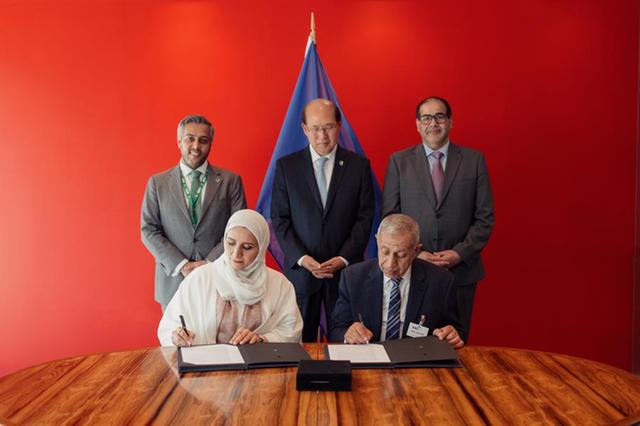The Arab Academy for Science, Technology & Maritime Transport (AASTMT) and The Arab Women in Maritime Association (AWIMA) signed an MoU at IMO HQ in London to explore opportunities for women’s participation within the academic sphere and thereafter to amplify the success of the regional maritime sector. The agreement is in alignment with International Maritime Organization’s (IMO) efforts to create gender equity in the maritime industry globally and United Nations’ (UN) 5th Sustainable Development Goal (SDG).
The MoU was signed by H.E. Eng. Hessa Al Malek, Advisor to the Minister for Maritime Transport Affairs, MOEI and President, AWIMA and H.E. Dr. Ismail Abdel Ghaffar Ismail Farag, President of the Arab Academy for Science, Technology and Maritime Transport.
Eliminating gender bias
Through this partnership, the entities will invite and encourage other IMO member states to actively support the development of AWIMA. The nations will also be prompted to work inclusively with the national agencies responsible for gender matters to ensure reporting on country compliance with the SDGs so that national planning, monitoring and resource allocation relevant to maritime specific SDG targets are integrated. It will encourage the equal participation of women at all levels of maritime education, training and research, and strengthen the national mechanisms for the employment of women in accordance with the stated objectives of the current SDGs, the Convention for the Elimination of All Forms of Discrimination Against Women (CEDAW) and any future goals established by the United Nations under the 2030 Agenda for Sustainable Development.
H.E. Eng. Hessa Al Malek, Advisor to the Minister for Maritime Transport Affairs, MOEI and President, AWIMA said: “The maritime industry has transformed gradually over the years, in terms of including women in the workforce. One of the key driving forces behind this change is the IMO and their commitment to addressing the current gender imbalance in the industry by putting in place an institutional framework. Apart from governments, we all need to accept our responsibility, whether it is policymakers, company owners, operators, stakeholders, and even professionals. Our collaboration with AASTMT, an institute that has consistently inspired and trained aspiring women maritime professionals to contribute to the sector’s success, is another move to achieve an inclusive industry.”
Encouraging the participation of Arab women
H.E. Dr. Ismail Abdel Ghaffar Ismail Farag, President of the Arab Academy for Science, Technology and Maritime Transport said: “It is an honour to collaborate with AWIMA to enhance national and regional recognition of the role of Arab women as effective contributors towards the development of the maritime economy. IMO’s gender program was first initiated in 1988. At that time, only a few maritime training institutes opened their doors to female students. Since then, IMO’s gender and the capacity-building program has helped put in place an institutional framework to incorporate a gender dimension into IMO’s policies and procedures. Today, apart from AASTMT, several institutions are educating talented calibres irrespective of their gender. That is the first step to creating an industry that has no gender bias. Thereafter, spreading awareness about the limitless opportunities for women and taking responsibility at an individual level to avoid any discrimination based on gender is crucial.”
In addition to this, both entities encourage the industry stakeholders to develop newer and strengthen existing gender-neutral operational frameworks, which substantively give women access to recruitment and employment opportunities, career path advancement and mobility, to the highest levels, in line with their experience and qualifications. They will also adopt the “IMO Arab Association for Women in the Maritime Sector: Establishment, hostship and governance guidelines” as the foundation for the establishment and operation of the Arab Women in the Maritime Sector Association (AWIMA).

